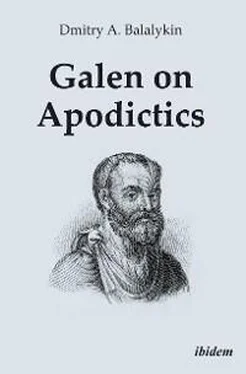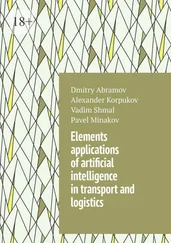ibidem-Press, Stuttgart
Contents
Foreword
Introduction
Chapter 1 Philosophical basis of Galen’s medical doctrines
1.1 Galen’s perspective on the Hippocratic tradition
1.2 The significance of the doctrines of Plato and Aristotle in shaping Galen’s views
1.3 The doctrine of Homoiomereia as the foundation of Galen’s views on the microstructure of tissue
Chapter 2 Understanding Galen’s clinical experience and apodeixis
2.1 The semiotics of diseases. Theory of pathogenesis as a reflection of the principle of causality
2.2 A comprehensive understanding of philosophical theory and medical practice
2.3 The unity of mind and body in Galen’s medicine and philisophy
Chapter 3 Anatomical dissections as evidence in a philosophical polemic
3.1 Galen’s method of investigation
3.2 The Empiricist school as the opponent of the Hippocratic tradition
3.3 The structure of proof in Galen
3.4 Galen’s understanding of the natural functions of the body as a realisation of the teleological principle
3.5 Galen’s clinical practice and physiological experiments
Conclusion
Bibliography
Alexander L. Gungov
The main objective of Dmitry Alekseevich Balalykin’s book, which appears as the seventh volume of Studies in Medical Philosophy at ibidemVerlag, consists in presenting the philosophical grounds for Galen’s integral theoretical and practical system, emphasizing the understanding and application of the apodictic method. The author clearly states that his concept of apodictics in ancient medicine consists in the understanding of “a combination of the use of anatomical dissections, the physiological experiment, the rational doctrine of general pathology and clinical systematization.” As a physician and distinguished historian of medicine, Balalykin is perfectly up to engaging with the medical side of Galen’s works. In terms of philosophy, the most significant part of Galen’s apodictic method is the “rational doctrine of general pathology and clinical systematization”, which is interpreted by Balalykin with appropriate erudition and skills.
Balalykin examines the ontological, epistemological, logical, and natural-philosophical conceptions of Plato, Aristotle, Anaxagoras, Empedocles, Stoicism (in particular works of Chrysippus), and the ancient аtomism as sources of Galen’s philosophical views (or as philosophical ideas that Galen does not accept but opposes), and their decisive influence on his theoretical medical concepts and clinical findings and claims. Balalykin pays special attention to the notions of eidos , lekton , entelechia , and cataleptic impression, as well as to Aristotle’s doctrine of the four types of causes. In regard to the apodictic method, various types of evidence known in antiquity are considered in his book: apodictic, aimed at reaching the truth; dialectical, meant to get to plausible conclusions, which could serve as hypotheses for further quests in the name of truth or for didactic and other practical purposes, including convincing interlocutors; rhetorical, dedicated to persuasion; and sophistic, striving to win a dispute at any cost, even by means of manipulation and deliberate misleading. In connection with the apodictic method, Aristotle’s categorical syllogism is discussed, whereas Stoic hypothetical syllogism is analyzed as a part of the dialectical method.
The author puts at the heart of his study of the transition from philosophical foundations to medical conclusions the ancient natural philosophical teaching of the three tetrads, followed by a number of ancient thinkers: the four elements—earth, fire, air, and water; the four humors—blood, phlegm, and yellow and black biles; and the four substances—hot, cold, dry, and moist. The book analyzes the fundamental philosophical and medical significance of the balance and imbalance between the members of each tetrad. Balance and imbalance are traced as being inseparable from the theory of homoiomereia in view of what in modern medical language would correspond to a certain extent to nosology, etiology, pathogenesis, therapy, and prognosis. Last but not least, the importance of the Platonic concept of the tripartite nature of the human soul for the understanding of causation in medicine, classification of diseases, control exercised by the higher rational and immortal part of the soul on the health and disorder of the body, as well as the unified origin of somatic and psychic disorders are underlined.
Balalykin has succeeded in structuring and conducting his research in view of the decisive influence of the rich array of philosophical ideas from Classical Greece and the Hellenistic period on Galen's medical theory and clinical practice. He is not tempted to interpret the theoretical legacy of the ancient physician only from the point of view of modern medicine or predominantly in the context of the development of ancient medicine per se, whereas putting into brackets such a seemingly distant and lateral area as ancient philosophy. The author reveals the formation of ontology of health and disorder on the basis of the principle of balance and imbalance within the four tetrads, as well as according to the theory of homoiomereia that defines the structure of the macro- and the microcosm. The quantitative idea of health and disease, as well as the presence of degrees of health and disorder, depend on these principles. Homoiomeres define the anatomical structure of the human body, where there are simple homoiomerous structures and tissues and complex non-homoiomerous organs. By carrying out an ontological line of reasoning, Balalykin repeatedly argues that these principles have allowed Galen to outline his concept of general pathology and to classify diseases. The author convincingly demonstrates that Galen's understanding of the causes of diseases starts from the same ontological basis. From the perspective of the ancient physician we cannot speak of the contemporary meaning of etiology, as in Galen’s classification of causes there is a trend of universalization, whereas etiology deals with the specific causes of pathology within a certain nosologic unit. However, Galen's understanding of the causes of diseases allows him to persist in treatment aimed at eliminating the causes of a pathology (today known as “etiological treatment”) and not simply at eliminating the symptoms. At the level of medical causality, the author makes a point of the four types of causes in Aristotle, shows how they have been transformed by Galen and, foremost, discusses the final cause that the ancient physician considers as a teleology of function of an organ or of the body as a whole. The doctrine of teleology, along with and inseparable from the principle of balance of the three tetrads and the principle of homoiomereia , are the main grounds for Galen’s rejection of the explanation of the ancient Methodists regarding the causes of disease. The assertion of the Methodist physicians, who have adopted the ontology of ancient atomism that the general pathology is due to clogged pores in a certain part of the human body, is unacceptable to him. He is a follower of Plato and Aristotle and the mechanics of the atomism does not correspond to the teleology of function, inherent in the body in the states of health and disease alike. Balalykin explains that the principle of teleology should not be confused with the Stoic determinism of physicians from the Empiric school that is set by blind fate and is completely beyond any rational control. Thus, the author unambiguously shows: the philosophical preconditions at the level of ontology preset Galen's position on medical causality. Furthermore, he clarifies that the mechanisms of diseases, pathogenesis, depend on the same ontological arguments.
Читать дальше












